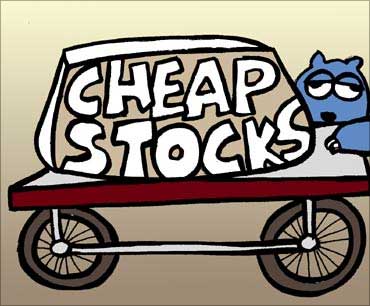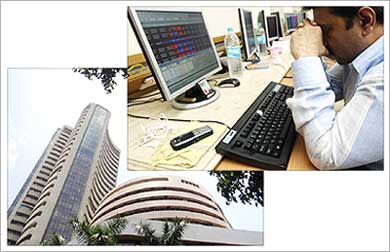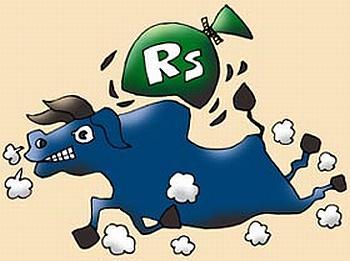Photographs: Rediff Archives Salil Dhawan, Investment-Mantra.in
As you switch on various business channels -- you will hear few common terms such as 'stocks trading at a 52-week lows' or 'this stock is a multibagger' or 'stocks trading at low PEs', 'penny stocks will make fortunes'. Make sure you don't react impulsively and beware of some of common pitfalls while investing in the stock market.
Myth 1: Stocks trading at a 52-week low are cheap
There may be time in the economic cycle when a blue chip stock may hit a 52 week low. Before you buy into the stock, analyse the reasons as to why stock hit a 52-week low. 52-week low in itself doesn't guarantee anything.
If the stock fundamentals are intact and stock price has gone down due to prevailing economic environment at that point of time, it can be a value buy especially for long term investors. But if something fundamentally has gone wrong with the company, it is better to stay away from the stock till some more clarity emerges.
Quality matters most while buying a stock.
Click NEXT for more
Courtesy: Investment-Mantra.in
7 common stock investment myths BUSTED
Myth 2: Index stocks are the best stocks
If this was true, most investors would safely park their money in such stocks in anticipation of huge profit without looking out for other value picks outside index. Most indices are collection of stocks with the highest market cap.
Take for example, Sensex companies that make up index are some of the largest, with stocks that are highly traded based on their free float.
Index stocks may or may not necessarily be best stocks as they are mostly based on market cap or free float of the company and not earnings. This doesn't mean all stocks of index are high earning stocks. One must take a stock by stock call.
The risk is certainly less with index stocks as they are well researched and leaders in their respective sectors.
Click NEXT for more
7 common stock investment myths BUSTED
Myth 3: Stocks that give high dividends are best bets
This comes from notion that regular dividends are extra income in the shareholder's hand. This may not always be true. While the company may be making decent payouts every year, the share price appreciation may not be comparatively high.
Before investing in companies paying high dividends, it's important to analyse if the company is reinvesting enough profits to grow its earnings consistently.
Click NEXT for more
7 common stock investment myths BUSTED
Photographs: Reuters
Myth 4: The worst is over for the stock market
Timing the markets is not something one can achieve with accuracy since equity market is never a stable environment. It is more of a gut feeling. One can never surely time the market. Markets are driven not just by earnings but also by sentiments.
No one had predicted that the bull run would take the Sensex from the level of 10,000 in February 2006 to over 21,000 in January 2008, just as no one had the idea of crash that followed which saw Sensex plummeting to 9,000 in March 2009.
Click NEXT for more
7 common stock investment myths BUSTED
Myth 5: Penny stocks make good fortunes
Penny stocks by nature are low priced, speculative and risky because of their limited liquidity following and disclosure. If it's easy to invest in penny stocks, it's also easy to loose.
Fortune can be made by high denomination stocks also. Denomination has nothing to do with rationale for picking a stock.
Retail investors are generally fond of stocks at sub-Rs 100 levels. But there may be stock trading at Rs 1,000 plus price but may well be cheap. Clarity on earnings is more important here. One should look at earning visibility, stock valuation, future growth prospects befor making an investment decision.
Click NEXT for more
7 common stock investment myths BUSTED
Myth 6: Stock trading at low P/E are undervalued
Price to earning ratio (P/E) is one of the most talked about ratios in the market. This is based on theory that stocks with lower P/E are cheap.
However, this should not be the sole criterion of investing in stock market. P/E multiples may be a quick way to value a stock but one should look at it in correlation with expected earnings growth, the risk factors involved, company's performance and growth potential.
Click NEXT for more
7 common stock investment myths BUSTED
Myth 7: Stock trading below book value are cheap
Book Value (BV) is the actual worth of the stock as in a company's books/balance sheet, or the cost of asset minus accumulated depreciation.
BV depends most on historical cost and depreciation and often has little correlation to the actual stock price.
Shares of industries that are capital intensive trade at low price/book ratios, as they generate lower earnings. On the other hand those business models that have more human capital will fetch higher earnings and will trade at higher price/book ratios.
Price/book ratio of below 1 may be cheap but one should see other aspects such as earnings forecast, guidance, management and debt on the books of the company.








Comment
article